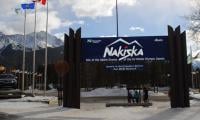Empowering chemical arms body West, Russia face off
Britain, which has condemned Russia over the nerve agent poisoning of an ex-spy, is pushing to give more teeth to the global chemical weapons watchdog so that it can identify those responsible for attacks with banned toxic substances.
The 20-year-old Organisation for the Prohibition of Chemical Weapons, which oversees a 1997 treaty banning the use of toxins as weapons, is a technical, scientific body which determines whether chemical weapons were used.
But it does not have the authority to identify perpetrators. A British-led proposal, which is backed by Western powers including France, Germany and the United States, but opposed by Russia, Iran and Syria, was to be debated at a special session of the OPCW starting on Tuesday.
The proposal would give the world body greater powers to assign responsibility for violations of the Chemical Weapons Convention. "Attribution goes beyond the mandate of the OPCW," the Russian delegation said on Twitter.
"The decision to create such a mechanism within the OPCW cannot be made at the special session" being held in The Hague. The meeting was stalled for nearly three hours by procedural bickering, with Russia and its allies questioning the rules on voting rights until the United States forced a vote to have the agenda adopted.
It passed by a wide majority. The draft proposal circulated by Britain, a copy of which has been seen by Reuters, would thrust the OPCW to the forefront of the diplomatic confrontation between the West and Moscow which has seen relations deteriorate to their lowest point since the Cold War.
Russia and Indonesia submitted rival proposals, but Western diplomats said they were not believed to have strong political backing.
It comes as OPCW inspectors prepare a report on an alleged poison attack in the Douma enclave near Damascus, Syria, in April that killed dozens and triggered air strikes by the United States, France and Britain.
Western governments have also blamed Syrian President Bashar al-Assad and Russia, which backs him, for using chemical weapons in the protracted Syrian conflict. Both deny using chemical weapons.
Up to now it has fallen to the United Nations, where a joint OPCW-UN team known as the Joint Investigative Mechanism (JIM) was created in 2015, to identify individuals or institutions behind chemical weapons attacks in Syria.
-
 Shocking Details Emerge In Martin Short’s Daughter Katherine's Death Investigation: 'Kept To Herself'
Shocking Details Emerge In Martin Short’s Daughter Katherine's Death Investigation: 'Kept To Herself' -
 Yerin Ha On Stepping Into The Spotlight In Bridgerton Season Four
Yerin Ha On Stepping Into The Spotlight In Bridgerton Season Four -
 Nakiska Ski Area Avalanche Leaves Youth Unresponsive, Second Skier Escapes Unhurt
Nakiska Ski Area Avalanche Leaves Youth Unresponsive, Second Skier Escapes Unhurt -
 Igor Komarov Missing In Bali: Seven Foreign Suspects Arrested In Kidnapping Probe
Igor Komarov Missing In Bali: Seven Foreign Suspects Arrested In Kidnapping Probe -
 'I Swear' Director Kirk Jones Says Bafta Broadcast Mishap Failed Tourette’s Advocate
'I Swear' Director Kirk Jones Says Bafta Broadcast Mishap Failed Tourette’s Advocate -
 Yogurt Shop Murders Solved: 1991 Austin Cold Case Finally Linked To Serial Killer
Yogurt Shop Murders Solved: 1991 Austin Cold Case Finally Linked To Serial Killer -
 Iran Tensions Rise As Trump Says He Is 'not Thrilled' With Nuclear Negotiations
Iran Tensions Rise As Trump Says He Is 'not Thrilled' With Nuclear Negotiations -
 Where Is Calvin Klein's Wife Kelly Klein Now After Divorce And Fashion Fame?
Where Is Calvin Klein's Wife Kelly Klein Now After Divorce And Fashion Fame? -
 Kourtney Kardashian’s Role As Stepmother Questioned
Kourtney Kardashian’s Role As Stepmother Questioned -
 Neil Sedaka Dies At 86 After Hospitalisation In Los Angeles
Neil Sedaka Dies At 86 After Hospitalisation In Los Angeles -
 'Lizzie McGuire' Star Robert Carradine's Reason Of Death Laid Bare
'Lizzie McGuire' Star Robert Carradine's Reason Of Death Laid Bare -
 Lisa Rinna Breaks Silence After Recent Reunion With Andy Cohen: 'I've Pissed Him Off'
Lisa Rinna Breaks Silence After Recent Reunion With Andy Cohen: 'I've Pissed Him Off' -
 Savannah Guthrie Mom Update: Unexpected Visitors Spark Mystery Outside Nancy's Home
Savannah Guthrie Mom Update: Unexpected Visitors Spark Mystery Outside Nancy's Home -
 Elle Fanning Shares Detail About Upcoming Oscars Night Plan With Surprise Date
Elle Fanning Shares Detail About Upcoming Oscars Night Plan With Surprise Date -
 Demi Lovato Spills Go-to Trick To Beat Social Anxiety At Parties
Demi Lovato Spills Go-to Trick To Beat Social Anxiety At Parties -
 Benny Blanco Looks Back At The Time Selena Gomez Lost Her Handrwritten Vows Days Before Wedding
Benny Blanco Looks Back At The Time Selena Gomez Lost Her Handrwritten Vows Days Before Wedding



